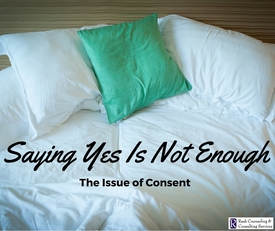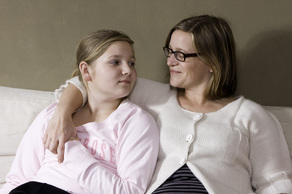 Have you had chance to talk to your teen about the definition of consent for sexual activity? If so, what did you learn? If not, what is keeping you from asking? In case you missed it, check out part one of this post to learn more: The #1 Parenting Mistake You Don't Know You're Making. When I ask teen clients about what consenting to sex means, I typically get one of two answers.
The truth is, simply saying yes to sex is not enough. Making an assumption that you know what the other person wants is definitely not enough. Keep reading to learn more about all of the aspects of giving true, informed consent to sexual activity.*
Now is the time to start talking with your teen about consent. If you don’t, who will? *This blog post is meant to be purely informational. The writer is not able to provide legal advice or instruction in anyway. Questions about specific examples will not be answered in the comments. Please contact an attorney if you have questions or concerns. Bethany Raab is a Licensed Clinical Social Worker in Denver, Colorado.
She is dedicated to helping teens and families be happy and healthy!  If you are like many parents, you are starkly aware of your imperfections when it comes to raising your children. You may have looked at this article with a combination of curiosity and dread. Rest easy. I am not here to tell you what you’re doing wrong – you don’t need that from me. What I do want to talk about is an issue many parents avoid addressing with their children. As kids grow, they become increasingly aware of their own bodies. They also pay more attention to others’ bodies and the presence of sexual images. These are cues that it is time for the “sex talk.” Some parents choose to let the school tackle sex ed. Other parents venture into this topic themselves. The longer I work with teens, it becomes more and more obvious that one specific issue is consistently left out of their sexual education, whether at home, school or both. The issue of consent. What do you think giving consent for sex entails? What do you think your teen knows about giving consent for sex? Ask them, and then come back to learn more: Saying yes to sex is not enough. Bethany Raab is a Licensed Clinical Social Worker in Denver, Colorado.
She is dedicated to helping teens and families be happy and healthy!
As an extra, here is an excellent workbook from the Love is Not Abuse Coalition. It will help you talk about dating violence with your teens. It can also be used in conversations with younger children who are not yet dating.
Bethany Raab is a Licensed Clinical Social Worker in Denver, Colorado.
She is passionate about helping teens and families be happy and healthy! |
Welcome!
Every blog post you see on this page is written especially for teens and their parents! Like it? Pin it!
Follow me!
Categories
All
|
||||||||


 RSS Feed
RSS Feed